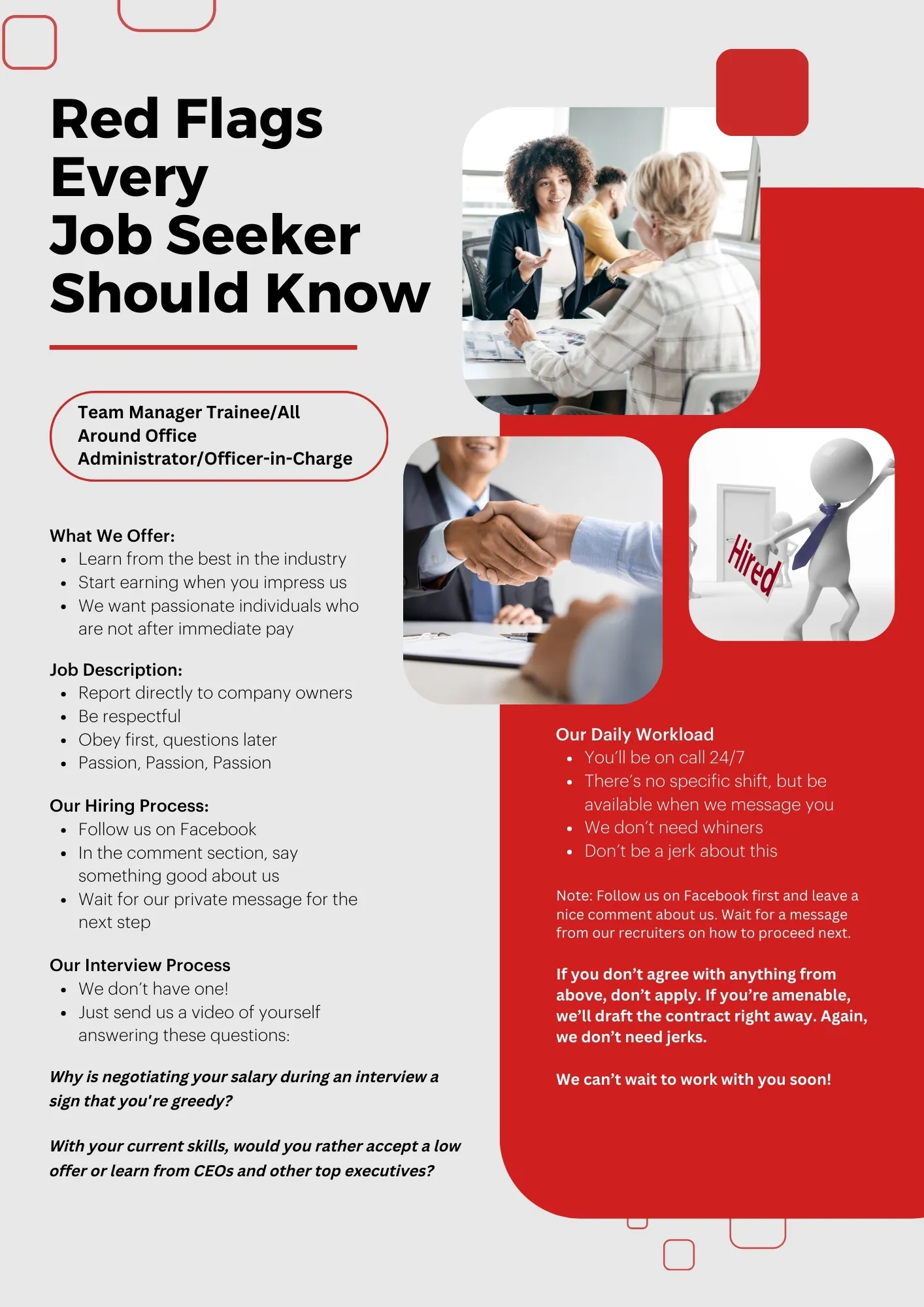
Recruitment is a two-way street. Companies want to hire the best possible candidates, and employees want to secure the best possible career path.
Just as employers watch out for red flags in any potential new hire, job seekers must also look for telltale signs that a company may not provide the dream opportunity they seek.
Sometimes, the sign can be as simple as a too-vaguely-worded job description or as complex as a toxic company culture.
So, before you submit an application or accept an offer, stay alert and look for these new job red flags.
Stop, Look, and Listen: 14 Red Flags in Job Interviews, Postings, and Hiring Processes To Watch Out For

#1: Don’t take the bait. Lowball offers aren’t worth it.
While searching for a new job, it’s essential to consider the following question: What’s the lowest possible salary you’re willing to accept?
To help you make an informed decision, research the average salary range for your particular role and industry. Adjust the numbers based on your years of experience, educational background, and other relevant factors.
A hiring manager will often ask for your preferred salary, and you need to be ready with a clear answer to avoid frustration and misunderstanding on both sides.
Sometimes, they will be upfront about not being able to meet the range you’re looking for. No harm, no foul. You can both move on.
However, if they specifically ask for your preferred salary and still offer a significant lowball as their “best offer,” this is a clear warning sign that they don’t respect your time and aren’t willing to pay what you deserve.
When these situations happen, don’t take the bait. Don’t feel bad about how long it took you to get the interview or wait for a response to your application. Say “no, thank you,” and start your job search again.
#2: Beware of vaguely written job descriptions.
Let’s talk about job application red flags. Did you know you can sometimes spot a warning sign as early as the first job posting?
It’s true. Job postings are supposed to give applicants a clear picture of what the role entails and what is expected of them.
So, if a job description seems too vague, disorganized, or unclear, it may be a sign that the company does not know what it wants in its ideal applicant.
If they don’t know what they’re looking for, they may also have unclear or unrealistic expectations about what you can offer their business. This can lead to endless conflict and frustration for you and your potential employer.
Our advice: Trust your instincts and steer clear of these vague postings.
#3: Don’t fall for a super rushed hiring process.
One of the most common challenges many job seekers face is enduring an extraordinarily long and drawn-out hiring process. However, the opposite problem—rushed recruitment—should also be considered a red flag.
Think about it this way: Hiring an applicant and accepting a job offer are big decisions that will impact the trajectory of a business and a person’s career. As such, it’s better for both the potential employer and employee first to get to know each other to determine whether or not their values and goals align.
Do you feel like the recruiter is rushing you through the interview process without allowing you time to ask questions and research the company before making a decision? Are they pressuring you to accept an offer letter with a “now or never” ultimatum?
If so, these may indicate that they’re desperate to fill the position and aren’t fully considering whether you are a good long-term fit for the role and the organization. This can lead to mis-hires and create frustration between the company and the employee.
Our advice is to ask the recruiter if it’s possible to slow down the hiring process so you can gather more information. Then, you can set a hiring timeline that will work for both of you. Be wary of recruiters who reject this request and continue to pressure you for an answer ASAP.
#4: Take note of inconsistencies between different interviewers.
When discussing job interview red flags, we can’t forget that some hiring processes involve multiple interviewers.
Recruitment specialists or other HR professionals handle the initial job interviews for most companies. Then, a manager or supervisor specific to the role and department you’re applying for may conduct a second interview. Some firms may also have a third and final screening process involving speaking directly with a top executive or a panel of executives.
Here’s a helpful tip for job seekers facing multiple interview stages: Ask relevant questions about your role, responsibilities, and the company culture. Then, watch out for any inconsistencies in the interviewers’ answers.
Did the recruiter tell you that a particular task will not be part of your workload, but the department head says otherwise? Has someone promised to match your preferred salary range, while another says they can only offer you a much lower wage?
Pay attention to these details. If the inconsistencies are too significant, it may be a sign that some are lying, or the company may be disorganized, with little to no communication between teams and departments. Either way, it’s a telltale sign that, if you sign on, you may have to deal with a messy and chaotic company culture.
#5: Stay alert when interviewers ask strange, inappropriate, or harassing questions.
Speaking of interview red flags, job seekers must be aware of the types of questions that recruiters or other interviewers ask.
Are they asking for intimate, personal details about your life that have nothing to do with your ability to perform your role? Do they use inappropriate, rude, offensive, or harmful language when speaking to you? Are they asking you to do a “favor” for them in exchange for employment?
These unprofessional behaviors are unacceptable; you have every right to walk away from the interview if you feel harassed.
Any company that allows people to misbehave in the workplace and chooses them as their brand representative when interviewing applicants is unlikely to provide its employees with a safe, healthy, and positive work environment.
#6: Watch out for companies with sky-high turnover rates.
Beyond looking for red flags in a job interview, employees should also research a company before sending in their applications. Mainly, you should try to find insight into the organization’s turnover rates.
There are many reasons for a firm’s high attrition rate, including overwhelming workload expectations, a high-pressure environment, low employee engagement, or even a lack of advancement opportunities. Usually, however, the root cause lies somewhere in the company’s culture.
If everything you’ve researched about a company suggests that it has an incredibly high turnover rate, this may be a warning sign that you should not accept that job offer.
#7: Be wary of recruiters who are unresponsive or take too long to communicate.
Did a recruiter ghost you after the initial interview, even after they promised to notify you whether you were accepted or rejected for the role? Have they ignored your attempts to follow up on the status of your application?
Or worse, did you accept a job offer but then receive no response (or a significantly delayed response) about when you should start your first day?
Although this may not be a full-on red flag, an unresponsive or uncommunicative recruiter may be considered one of the yellow flags job seekers must watch out for. When these situations occur, it is best to temper your expectations and consider your other options instead of putting all your eggs in one basket.
After all, how you are treated during the recruitment process can give you a glimpse into an organization’s values and how they treat employees. If they can’t properly communicate with candidates, then they’re unlikely to be better at communicating with their existing workforce.
#8: Step away from companies with unrealistic expectations.
During a job interview, red flags can pop up at the most unexpected moments. Perhaps you were already excited to work for a specific company until you heard your interviewer mutter about working long hours without overtime pay.
Or, maybe you ask about work-life balance and company culture, and they’re reluctant to give you specifics about your expected workload, saying that you’ll have to be comfortable rolling with the punches.
While some degree of difficulty is normal, it’s important to distinguish between a healthy challenge and an overwhelmingly unrealistic expectation. Ideally, you’d find en employer that cares about your mental health and well-being and provides resources and support to help you deal with stress and avoid burnout.
#9: Don’t rely on informal agreements.
One of the biggest mistakes many job seekers make is assuming that an email or text message saying “You’re hired” is enough to throw all caution to the wind. They assume it means that they’ve already secured the role.
The truth is that a job offer is only valid once you receive your formal offer letter. This document will include everything you need to know about the terms of your employment, including job title, compensation and benefits, starting date, and more.
Without an offer letter, you have no legal proof that you’ve been hired. Some people make the mistake of quitting their jobs or relocating to another location near their new potential employer despite not receiving an official employment contract.
If an employer tells you you’ve been hired but refuses or delays giving you this document, this is a massive red flag you can’t ignore.
#10: Keep an eye on vague future promises.
Just as you shouldn’t rely on informal agreements before making major life decisions, you must also be wary of recruiters who make future promises without merit.
For instance, a hiring manager may persuade you to agree to a lower salary than expected, promising a significant raise “in the future.” They may also make commitments they don’t have the authority to enforce, such as promising a promotion or an informal benefit.
To ensure that a “promise” can be realistically enforced, get it in writing while negotiating your job offer.
The company should be able to provide you with a timeline (i.e., “You will only be eligible for a raise after X months and after you pass your performance evaluation”) and tell you what you need to accomplish for the terms they promised to come to fruition.
#11: Watch out for employers that don’t respect work-life boundaries.
Before accepting a job offer, you and your potential employer must agree on what a full-time position means.
Do they expect you to work 40 hours a week and only put in overtime during emergencies? Or do they expect you to be on-call at all times, even past your regular schedule?
There should be a clear structure and agreement about the reasonable expectations for your job (i.e., you only answer work-related questions during your shift).
If your employer expects you to answer work emails even after you’ve left the office or answer their calls late at night, this is a telltale sign that they don’t respect work-life boundaries.
#12: Stay away from condescending or unprofessional interviewers.
A job posting may attract you to apply for a role, but the interview is usually what seals the deal. Interviews allow you to learn more about the organization and whether you fit their specific company culture.
As such, if your interviewer shows up late with no explanation, oversteps boundaries, asks condescending or rude questions, or displays unprofessional behavior in any way, it’s a major red flag.
If this is how they treat you early in the recruitment process, then expect to have your boundaries pushed even further once you’ve been hired.
Ideally, a company would utilize skills-based hiring to more precisely assess whether a candidate is a good fit for the role while preventing interviewers from “going off-script” and acting unprofessionally.
#13: Don’t feel obligated to accept a role that lacks advancement opportunities.
What are your career goals? Are you the type of worker who wants to stay at a company long-term and grow professionally within the organization?
If so, make sure to ask your recruiter about the available advancement opportunities in the company.
No matter how good their current offer seems on paper, if they can’t provide the professional growth you seek, this may be a “yellow flag” you’ll have to consider before accepting the job. Although this is not true in all cases, a lack of advancement opportunities can signal a stagnant organization with limited growth prospects.
#14: Check every potential employer for negative reviews.
Beyond red flags in job postings and interviews, reading positive and negative reviews online can also give you a more complete picture of a company’s culture.
You can look up an organization on websites and applications, such as Indeed or Glassdoor, that allow employees to provide feedback on a company and their work experience.
If you have LinkedIn connections who have previously worked for the business you want to apply to, ask them about their perspective on the company’s culture and environment.
Mixed reviews can be a yellow flag that helps you decide whether a company fits you. However, a flood of overwhelmingly negative comments from past employees signal something irreparably wrong or broken about the work environment.
Searching for Call Center Jobs? Work for a BPO Company With All the GREEN Flags!
Job hunting can be overwhelming, but as long as you know the red flags, you can successfully navigate this process and land your dream role.
If you want to work for an employer with all the GREEN flags, don’t hesitate to send an application to SuperStaff.
At our people-centered BPO company, we prioritize employee experience and treat all applicants with the respect and professionalism they deserve.
From customer service representatives to data science specialists, we’re looking for a wide range of outsourcing professionals to join our growing team.
Follow us on Facebook and LinkedIn to stay updated on our latest job opportunities. Don’t miss your chance to join our Super Fam!






